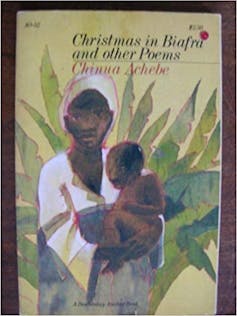
During the massacre of Igbos Biafrans in Nigeria between 1966 and 1970, More Than three million people died. In the decades since, writers have worked to make sense of the immense human tragedy.
These literary representations of the massacres use the Holocaust as an important point of reference.
The war in Nigeria, with its associated mass atrocities, is arguably one of the first major moments in postcolonial Africa when accusations of genocide were made. Following military coups in Nigeria in 1966, the military and ethnic extremists systematically targeted and killed Igbos across the then Northern and Western regions of Nigeria.
Massacres of Igbos and other Easterners across the country led to thousands of deaths and the displacement of millions.
The massacres led the Eastern Region of Nigeria to declare its secession from Nigeria. The region was renamed the republic of Biafra. Nigeria invaded Biafra in July 1967, leading to a protracted war. The federal government used starvation tactics which led to upwards of three million civilian deaths in Biafra. Biafra officially surrendered to Nigeria in January 1970.
After its genocidal war, the Nigerian government proceeded to engineer a culture of denial.
To counter that propaganda, writers reflecting on that past have often framed the war as genocide. A common feature in the writings is the comparison of Igbo experiences of atrocities to Jewish ones during the Holocaust.
The Holocaust as cultural icon of genocide
During the Biafran War, U.S.-based Igbo poet, Onwuchekwa Jemie, compared the murder of Igbos in Nigeria to the Nazi German murder of Jews during the Second World War. His poem, “Requiem” (from his 1970 poetry collection, Biafra: Requiem for the Dead in War) reflects this:
Once in 53
Three times in 66
Nigerians shoot civilians
through the ears
rehearsing all known tortures
murdering all males
and raping old women
forcing teenage girls in leper clinics
hundreds butchered…
the 30,000 innocents
mowed down Nazi fashion
a final solution
that failed again.
In “Requiem,” Jemie catalogues the systematic persecutions and murders of Igbo civilians, which he considers similar to the Nazis’ “final solution.”
The lines “a final solution / that failed again” encapsulate the poet’s defiant view that Biafra will survive the genocidal onslaught from Nigeria.
Global history scholar Lasse Heerten has explained in his work on Biafra, that such comparisons of Igbo suffering to the Nazi genocide of Jews reveal the growing awareness of the Holocaust in African conflict zones at the time.
The comparison of Igbo suffering to the Holocaust offers a way for the writers to internationalize Igbo experience in Nigeria. In so doing, they are sharing a moral message about the universal condition of human cruelty.
The cruel human condition
Similarly, the 1971 poem “Vultures” by Chinua Achebe reflects on the troubling realization that humans possess simultaneously a capacity for human care and a vulture’s inhumane savagery. The poet imagines a Nigerian military commander as a vulture and compares him to the Commandant of the Nazis’ death camp at Belsen:
Thus the Commandant at Belsen
Camp going home for
the day with fumes of
human roast clinging
rebelliously to his hairy
nostrils will stop
at the wayside sweetshop
and pick up a chocolate
for his tender offspring
waiting at home for Daddy’s
return…

Achebe’s reference to the Holocaust evokes the Nazi death camps as a site of savagery: “fumes of / human roast.” He seems to be alluding to Paul Celan’s 1948 poem, “Death Fugue,” which describes the cremation of Jewish victims in the Nazi camps as a “grave in the sky.”
Reference to the Holocaust in Achebe’s poem provides a way to meditate on the ironic condition of human cruelty.
Another writer who used the Holocaust as a metaphor for moralizing about the human condition is Nobel laureate Wole Soyinka, who was jailed for his attempts to mediate between Biafra and Nigeria. His 1972 prison memoir The Man Died expresses his frustration over the unending cycles of brutality and the pattern of genocidal murders taking place in Nigeria. Soyinka’s other books, plays and poems on the 1966-1970 crisis equally draw on the Holocaust as a way to comment on cruelty.
‘And the World Has Remained Silent’

Such comparison between Igbo suffering and the Holocaust intending to convey a moral message on human condition can be found in several other writings, including Flora Nwapa’s Never Again, Chris Abani’s Graceland (2004), Nnedi Okorafor’s fantasy novels, Who Fears Death (2010) and The Book of Phoenix (2015), and notably too in Chimamanda Ngozi Adichie’s novel, Half of a Yellow Sun (2006).
In Half of a Yellow Sun, there are several instances comparing the experiences of Igbos to those of Jews under the Nazis.
For example, the title of the character Ugwu’s story, ‘The World Was Silent When We Died,’ echoes the original Yiddish title of Elie Wiesel’s Holocaust memoir, Un di Velt Hot Geshvign, (“And the World Has Remained Silent”).
Universalize can also mean generalize
I believe these literary analogies between Jewish and Igbo experiences have helped to make the atrocities public and known. However, these analogies can also overwhelm the particulars of the Nigerian context of the crisis.
Because the political contexts of such historical mass atrocities being compared vary significantly, these comparisons may come at the cost of our understanding of genocide in African states. Both African and European historical contexts within which these atrocities occurred may become de-territorialized and depoliticized.
In the meantime, local suppression of political questions of Igbo self-determination and justice in the war’s aftermath remain unaddressed.









No comments:
Post a Comment